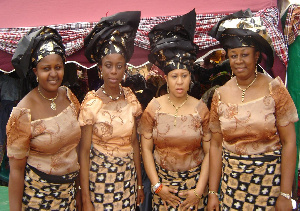Nigeria gained independence on October 1, 1960. A federal government structure with an elected prime minister and ceremonial head of state was formed by a new constitution.
After neither party obtained a majority in the 1959 elections, the National Council of Nigeria and the Cameroons (NCNC) then led by Nnamdi Azikiwe (who had taken over following Macaulay’s death in 1946), formed a coalition with Tafawa Balewa’s Northern Peoples Congress (NPC). Azikiwe accepted the mostly ceremonial office of president of the Senate while Balewa retained his position as prime minister, which he had held since 1957.
The northern portion of the Trust Territory of the Cameroons joined the Northern region in June 1961 as a result of an UN-supervised referendum, and in October the Southern Cameroons merged with Cameroon to establish the Federal Republic of Cameroon. On January 1, 1963, Nigeria established a republic. Azikiwe was elected as president of the nation.
The world’s most populous Black country is Nigeria. It is the center of fashion, technology, and creativity in Africa and is home to the second-largest film industry in the world.
Why the popular Chitenge African cloth has multiple names
Nigeria offers a wide variety of flavors to experience, from its fascinating history to its breathtaking natural beauty, alluring locations, and kind people. Nigeria contains more than 250 ethnic groupings, and its citizens adhere to a wide range of traditions and customs. Here are a few of the distinctive traditions and rituals that Nigerians are renowned for; the majority of these traditions are comparable to those from other regions of the world.
Omugwo (After-Birth Care)
Omugwo is extremely important to the Igbo people and is also widely used by other tribes in Nigeria. It is known as “Itoju omo” in Yoruba, “Iwagwala-oma” in Igala, and “Umaan” in Annang. A mother-in-law visits the house to care for the new mother and child after the woman gives birth. Everything is taken care of for the nursing mother, including bathing the infant, rubbing the new mother’s belly, doing domestic duties, preparing special meals such as pepper soups, and so on. The woman’s own mother or a close cousin can assume the role if the woman’s mother-in-law is unable to perform an omugwo.
Omugwos are a source of pride and are so symbolic that they have been known to lead to disputes between family members over who is best equipped to care for the nursing mother and her newborn. Omugwos persist for a minimum of three months.
Sunday Rice
Sunday rice is a staple food in most Nigerian households every week. For some people, looking forward to the customary dinner after church makes every Sunday complete. Others find that making the delicacy and serving it to their loved ones or neighbors makes all the difference. On Sundays, stew with chicken, beef, or fish is typically served over plain white rice and is cooked with tomatoes and pepper. On special occasions, however, it might be mixed, fried, jollof, or any other type of cooked rice.
Spraying Money
Some people only participate in this fascinating tradition at ceremonies in Nigeria. Regardless of their financial situation, guests come forward while dancing to shower money on participants on the dance floor at lavishly planned weddings, funerals, child naming or dedication ceremonies, and birthday parties. Naturally, only sharp notes are recommended.
The act (or art) of money spraying has a variety of purposes, such as displaying the celebrant’s social standing, demonstrating how much they are valued, and just displaying flamboyance and wealth. The symbolic act of spraying money during Nigerian ceremonies is so strong that an Ijaw bride won’t smile until she has received it.
It is essential to note that Nigeria has a rich cultural heritage and has made significant contributions to a variety of fields, including music, fashion, the arts, gastronomy, and more. From its wealthy past to its inventive people, including scholars, techpreneurs, artists, and campaigners, Nigerians are renowned for their numerous artistic creations, which reflect their vivacious and amiable energy.
Nigeria, happy independence!
Source: face2faceafrica.com
 Home Of Ghana News Ghana News, Entertainment And More
Home Of Ghana News Ghana News, Entertainment And More




